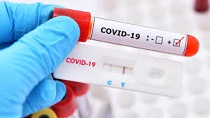Opinion:
BY DR. TITILOPE DOKUNMU
Covid-19 is no longer a scare around the world because the pandemic is over, it is now a long-term disease just like any other infectious disease that is treated according to standard guidelines. However, there is a silent creeping burden of post covid-19 impact on public health with post-Covid consequences even at very low transmission rates.
The silent burden of covid-19 arises from complications from previous covid-19 exposure. These conditions called covid-19 post-acute sequalae (or long Covid) refers to aggravation of pre-existing conditions, or development of new symptoms ranging from neurological conditions, fatigue, brain fog, multiple organ damage, etc.
The silent undetected burden of long Covid presents differently in people, hence it is sometimes difficult to identify. It is therefore necessary to consider previous history of covid-19 in patient management of seemingly unrelated new diseases to reduce public health burdens that soon will arise from covid-19 complications or long Covid.
Also, there is a need for public awareness of the spread of new variants (forms) of Covid and post-Covid conditions (long Covid), which can develop into serious conditions that lead to death. Back in the year 2020, who would guess that a new virus which emerged in late 2019 would cripple the world in a pandemic that has infected to date over 760 million people and killed over 7 million persons globally.
Coronavirus disease 2019 known as (covid-19) is an infection caused by severe acute respiratory syndrome coronavirus 2 (SARS-CoV-2 virus) characterized by rapidly spreading respiratory illnesses affecting multiple organs in children and adults. Covid-19 causes a barrage of mild to moderate symptoms and in severe cases leads to death, but long Covid presents like chronic conditions. In most cases, long Covid is identified months after recovery from covid-19.
The acute infection involves viral attachment to a receptor on the surface of host cells, in particular Angiotensin converting enzyme 2 receptor on lung cells, to infect humans. Several other events take place after the virus attaches itself to the host cell and these include viral replication, viral release which causes the acute infections but long Covid continue to develop over a long time.
Covid-19 pandemic put the world to a stop in 2020 because public health experts and scientists were caught unprepared with the magnitude of the widespread of the virus, the overwhelming effects on the health systems and unprecedented deaths. Covid-19 was a newly discovered virus, but it was later found to be very similar to the known SARS and MERS viruses which causes severe respiratory illnesses.
In the early months of the pandemic, there was no drug known to treat the unknown virus or vaccines to prevent its continuous spread. Several strategies were used to manage patients, many of whom developed severe cases that led to the high number of deaths. It then became apparent to the world – including first world countries, that we were not pandemic ready!
This was due to high shortage of ICU facilities, staffing, as well as shortage of medical supplies. Strategies included social distancing, whereby movements were largely restricted and social gatherings – this reduced the transmission, but the virus soon defied this strategy and continued to spread therefore therapeutics and other preventive approaches were quickly developed.
Another public health concern of covid-19 virus is the changes in parts of its genetic makeup (genome) – a term called mutation, just like other viruses. These variants differ slightly in their genetic makeup, the severity of covid-19 illnesses they cause and the ease of transmission. As a prevention strategy of covid-19, many vaccines were rolled out globally. In the wake of the pandemic, some vaccines prevented infection but soon the covid-19 virus continuously mutated causing many vaccines to be discontinued or booster shots (2nd, 3rd, 4th doses) introduced.
New variants are now causing rising cases of covid-19 in western countries, like JN.1 and KP.2 variants in the UK and US as of July 2024, but in Nigeria, transmission has been insignificant, and BA.2.86 variant circulating according to CDC, however the burden of long Covid is not yet known. Scientists are still in search for more treatments for COVID-19 emerging variants, and more importantly understanding the silent burden of long-Covid.
The currently used drugs including Remdesivir, Molpunavir, etc only treats the acute early stage infection but drugs are yet to be developed to prevent or treat long Covid which may impact the world masked as an increase in chronic diseases thereby increasing combat covid-19 and its consequences to prepare for any future pandemics and post-Covid sequalae.
*Dr. Dokunmu is an Associate Professor of Biochemistry, she has expertise in pharmacology, biochemistry and molecular biology.
 Startrend International Magazine For Your Latest News And Entertainment Gists
Startrend International Magazine For Your Latest News And Entertainment Gists





